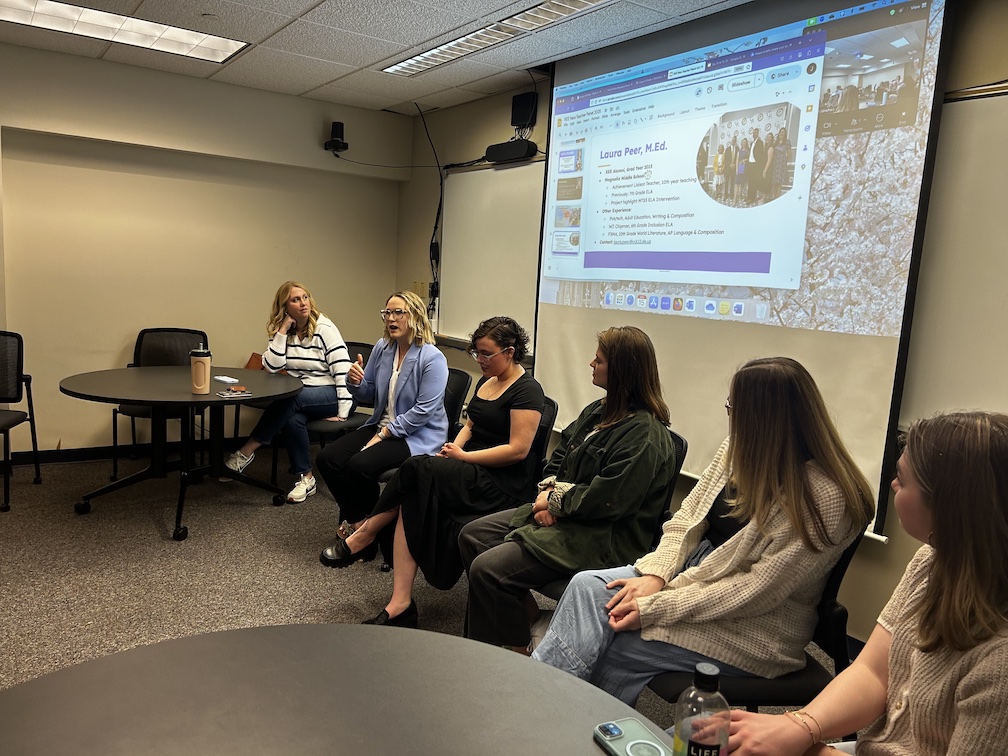
Category: Secondary Education
UD’s Secondary Education Program
June 17, 2025 Written by Margo McDonough
2025 Secondary Education Graduate discusses UD experience: https://capture.udel.edu/media/1_2sf8lzto/
Lucas Rosado was feeling good at his last-ever undergraduate class at the University of Delaware. On that May evening, the earth science education senior was making a final presentation about his student teaching experience. He already had a job lined up at William Penn High School in New Castle, Delaware, where he will teach physical science to ninth graders this fall.
Rosado isn’t the only UD secondary education graduate feeling good these days. Graduates of this nationally accredited and recognized program are in high demand in local middle and high schools, as well as nationally.
Whether a student is passionate about math, science, English or social studies, the secondary education program enables successful graduates to attain institutional recommendation, and ultimately state certification, to teach their desired content area in middle and high schools. Music and world languages programs provide pathways for students to attain institutional recommendation and state certification to teach K-12. Within those six disciplines, there are a wide range of majors, from anthropology education to physics education, biological sciences education to mathematics education.
UD houses its many education programs in three colleges; the College of Arts and Sciences is home to the secondary education program.
“The benefit to having these programs in the College of Arts and Sciences is the strong content preparation our students receive,” said Trish Hermance, senior assistant dean of Secondary Education. “They head into the classrooms prepared as content experts as well as knowledgeable in pedagogy,” she said.
Learning by Doing
On any given day, secondary education students are just as likely to be in a middle or high school classroom as they are to be in a campus classroom. A hallmark of the program is early and frequent field experiences.
“Many of our students begin observing and working in area public schools as early as their first year at UD,” said Hermance. By getting into the classroom quickly, aspiring teachers can bridge theory and practice, and start applying what they’ve learned. It can be a confidence builder, and a way to start shaping one’s personal teaching philosophy.
It was all that and more to recent graduate Hallie Allen, an earth science education major who will begin graduate studies back home in Long Island, N.Y. this fall.
“At UD, I learned so much about myself and how I want to be as a teacher,” said Allen. “Through observations and my own student teaching experience, I was able to see different teaching styles and different classroom environments. I used those experiences to help me develop my own approach.”
Recent graduate Madison Moore said that her field experiences have made her a more effective teacher. “It showed me a lot of examples of how teachers run their classrooms. Without that, I wouldn’t have found what works for me, and how I want my future classroom to be,” she said.
The secondary education program also is committed to preparing teachers who are responsive to different student backgrounds. Assistant Professor of English Kisha Porcher is a leader in the Delaware Black English Language Arts Clinical Educator Network. Each year, this program pairs Black classroom teachers with English education majors for their junior year field experiences.
“I found that when our students did their student teaching experience, they often had a lack of experiences with teachers of color,” noted Porcher. “This program includes a capstone project in which students can reflect about what they learned through this racial literacy development project.”
Helping New Teachers Take Flight
Nearly half of all new teachers in the U.S. leave the profession within five years, according to the National Education Policy Center. Factors cited include stress; systemic challenges, such as large class size; and lack of support.
UD’s secondary education program ensures that new teachers feel supported by helping them develop professional networks long before graduation day. For example, this spring English education held an alumni panel.
“Several distinguished alumni came to campus one evening to talk about the realities of teaching and share their tips for success,” said Jill Flynn, program director for English education. “One presenter was Kat Locke-Jones, a Baltimore seventh grade English teacher who is currently Maryland Teacher of the Year.”
“The more people you have in your corner, the better,” said Hermance. “We ensure our students connect and collaborate with professional educators, with school leaders, with their professors and with other students. By the time they graduate, they have built a professional network that will help get them through the rough spots.”
Learn More
Visit the secondary teacher education program’s website to learn more about the program. Contact Trish Hermance at trish@udel.edu or 302-831-0509.

